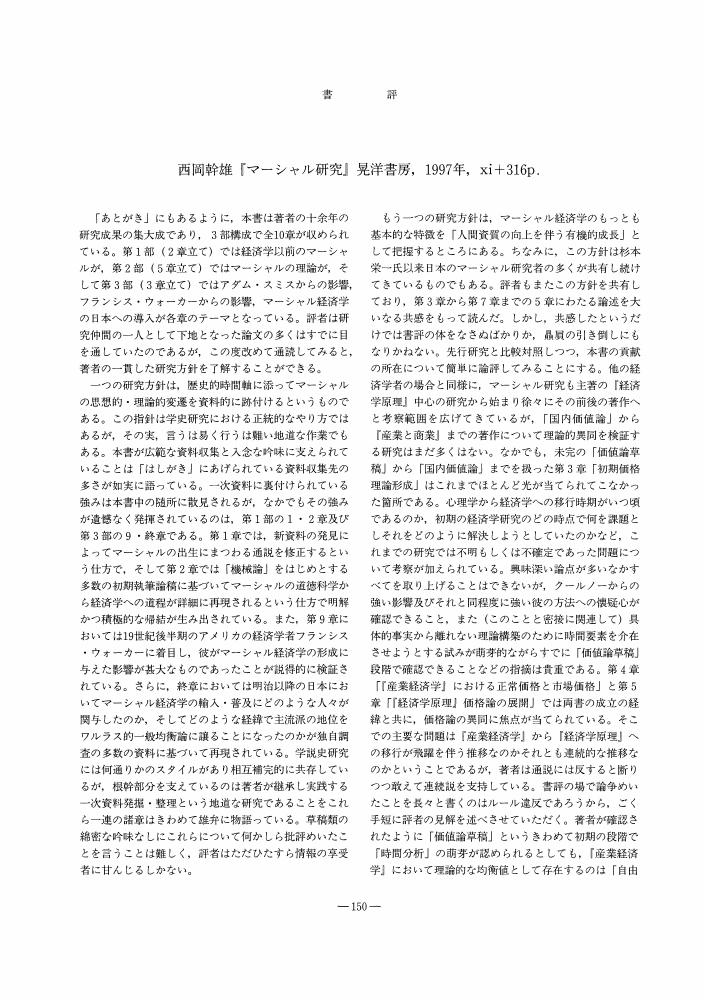8 0 0 0 OA 金沢城石垣の安定性
- 著者
- 川村 國夫 西岡 幹雄
- 出版者
- 公益社団法人 地盤工学会
- 雑誌
- 地盤工学研究発表会 発表講演集 第37回地盤工学研究発表会
- 巻号頁・発行日
- pp.1803-1804, 2002 (Released:2003-05-20)
1 0 0 0 OA 本多利明の「自然治道」論と開発経済モデル : 政策思想における「西域」型経世学への転換
- 著者
- 西岡 幹雄 Mikio Nishioka
- 出版者
- 同志社大学経済学会
- 雑誌
- 經濟學論叢 = Keizaigaku-Ronso (The Doshisha University economic review) (ISSN:03873021)
- 巻号頁・発行日
- vol.51, no.3, pp.73-140, 2000-02-20
- 著者
- 西岡 幹雄
- 出版者
- The Japanease Society for the History of Economic Thought
- 雑誌
- 経済学史研究 (ISSN:18803164)
- 巻号頁・発行日
- vol.61, no.2, pp.22-39, 2020 (Released:2020-02-26)
- 被引用文献数
- 1
Economic thought in pre-modern Japan was different from Western rationalism in that it did have a religious basis in the aspect of self-interest. Therefore, the Japanese society had to address tensions between public and individual interests, as pre-modern Japan had yet to understand the essence of institutionalisation as a deepening of the market, which included regionalisation and commerce. This paper will discuss Nakai Chikuzan (中井竹山, 1730-1804), who not only entrusted the adjustment of the ‘interests of the whole nation’ (「万民ノ利」) and the public good to internal social morality through giri(「義利」) but also sought public welfare and institutional recognition for the stabilisation of local societies. His emphasis on public welfare and social stability was important for the time restriction problem in relation to the maintenance of the moral and cooperative community, as well as the formation of economic rationality as an internal mechanism to address people’s interests.
- 著者
- 西岡 幹雄
- 出版者
- 経済学史学会
- 雑誌
- 経済学史研究 (ISSN:18803164)
- 巻号頁・発行日
- vol.59, no.1, pp.117-118, 2017 (Released:2019-10-12)
- 著者
- 西岡 幹雄
- 出版者
- The Japanease Society for the History of Economic Thought
- 雑誌
- 経済学史研究 (ISSN:18803164)
- 巻号頁・発行日
- vol.52, no.1, pp.1-19, 2010 (Released:2019-08-20)
- 被引用文献数
- 1 1
Abstract: Dazai Shundai (1680―1747) associated the problem of the interest in people’s welfare by creating useful means for which they enriched their lives with institutionalization processes of political economy in the early eighteenth-century Japan. He meant that the purpose of public welfare-to cause stability and prosperity of the community and people’s lives in general-was established as a part of practical learning, through institutionalization. This offered a practical approach to rationality. Dazai linked “the road to public welfare by interests” with the management of the state and human relief. When he attempted to discuss the problem of the ‘the law of joheiso’ as an institutional framework, on the basis of the theme of public welfare of people by interest, his philosophy of political economy contained a systematic design for welfare and economy. This included the manner in which a solution that loses touch with private interests is able to adjust “the world and the nation” as external public interests. However, Dazai’s conclusion was unable to absorb in a unilateral manner the frame cost in order to advance institutionalization, and would overload public welfare. Before creating an institutional design, what can morality in the social climate constitute in the institutional performance among incentive structures? The activation, based on moral recognition, widely needed the foundation of the institutional design for public welfare and its spillover effect. In this sense, Dazai’s image of humankind was that of an uncooperative situation, which was due to his belief that people were unable to be endogenous in their learning function. JEL classification numbers: B 11, H 11, N 35.
- 著者
- 西岡 幹雄
- 出版者
- The Japanese Society for the History of Economic Thought
- 雑誌
- 経済学史学会年報 (ISSN:04534786)
- 巻号頁・発行日
- vol.36, no.36, pp.174-175, 1998 (Released:2010-08-05)
1 0 0 0 OA 西岡幹雄『マーシャル研究』晃洋書房, 1997年, xi+316p.
- 著者
- 藤井 賢治 西岡 幹雄
- 出版者
- 経済学史学会
- 雑誌
- 経済学史学会年報 (ISSN:04534786)
- 巻号頁・発行日
- vol.36, no.36, pp.150-152, 1998 (Released:2010-08-05)
1 0 0 0 OA Rita McWilliams Tullberg (ed.), Alfred Marshall in Retrospect, Edward Elgar, 1990, viii+228p.
- 著者
- 西岡 幹雄
- 出版者
- The Japanese Society for the History of Economic Thought
- 雑誌
- 経済学史学会年報 (ISSN:04534786)
- 巻号頁・発行日
- vol.30, no.30, pp.102, 1992 (Released:2010-08-05)




